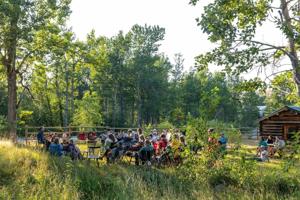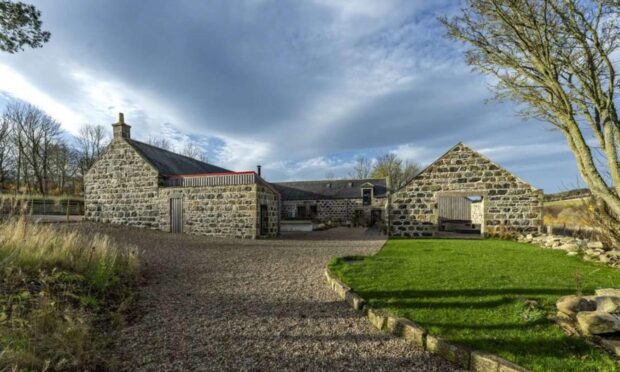After the Trump administration suddenly cut funding for the National Endowment for the Humanities last week, the effects will be felt in communities around Montana. The budget cuts, enacted by the White House and billionaire presidential adviser Elon Musk’s so-called Department of Government Efficiency, stripped Humanities Montana, a nonprofit funded by the NEH, of almost all of its budget and led directly to the cancellation of events in cities and towns that could extend farther in the future. Many of these are in rural areas with programs that are picked by local organizations that cater to local interests.
Philip Page, a saddle-maker who lives in Dillon, won't give one of his popular presentations on cowboy poetry at the Harlowton Public Library, which serves a town of less than a thousand people. While River Art & Books, a literary nonprofit in Roscoe, a town of less than 20 people located between Columbus and Red Lodge, already received its grant to host readings in 2025. Their director said that without that funding, they couldn’t bring speakers in.

Montana author Rick Bass reads at River Arts & Books last summer. The nonprofit is based out of a historic cabin in Roscoe, a small community northwest of Red Lodge. Chris La Tray, an award-winning Métis storyteller and nationally recognized writer, started working with Humanities in 2023 when he was named poet laureate.
Since then, he’s done 90 presentations and plans on finding ways to continue to do them regardless. He called the cuts “repugnant.” He’s logged 40,000 miles on his vehicle in the past 10 months, visiting schools, universities, museums, libraries, theaters, and nonprofit groups where the turnout is “anything from a thousand people to 10 people.
” “All of these communities have an interest in the arts, and for the most part, the only way they can afford to bring people there is with the support of an organization like Humanities. And they deserve to be exposed to that kind of thing as much as any other place does,” he said. Humanities Montana is one of 56 state humanities councils in U.
S. states and jurisdictions such as the territories and the District of Columbia that were created by the NEH in 1972. On Wednesday, April 2, at nearly 10:30 p.
m., Humanities Montana Executive Director Jill Baker received an email from the acting NEH chair Michael McDonald. Her organization's major operating grant, along with all the state councils’ funds, were terminated.
The grant is a little under $1 million per year to serve all 56 counties in the state, comprising 90% of the budget for Humanities, a nonprofit that operates in a public-private model. Since DOGE began making cuts across agencies and branches of government, there’s been confusion about how the cuts are made and how quickly they’re enacted, in addition to the legality of withholding funding approved by Congress. Humanities Montana is exploring its legal options, Baker said, but the cuts are immediate because of the way the state councils operate.
They don’t receive grant money upfront for programs, they submit for reimbursement after the fact. “We can't receive that funding until after we spend it, so when they terminate our grant, that’s it,” Baker said. Last week, they quickly notified their speakers that the Montana Conversations, Speakers in the Schools and Poet Laureate programs have been canceled, and warned that if anyone who proceeds with planned events won't receive any compensation.
The agency’s funds are now severely limited to what Baker described as a “modest” reserve and a staff of six people. “We’re doing the best that we can to keep staffing as long as possible, in hopes that we will be able to have an injunction or something like that to get access to our funding again,” she said. Their nationwide advocacy group, the Federation of State Humanities Councils, has pushed for a grassroots campaign for residents to notify elected officials of the effects of the cuts.
Humanities Montana is encouraging people to contact Montana lawmakers. Baker said they're also soliciting donations “to help us weather the storm until we can get Congress to continue to allocate funding for cultural services,” including NEH, the National Endowment for the Arts and the Institute of Museum and Library Services. “We want to be able to continue to do good work around our state,” she said.
Arts organizations in Montana are wary of the potential for more cuts. The Montana Arts Council sent an email newsletter out on Friday, April 4, warning that the National Endowment for the Arts is “preparing for its own visit from DOGE, which is expected.” In the past five years, the NEA has distributed more than $12 million in federal money in Montana either directly or through state and regional support, according to its website.
Humanities Montana presenter Mary Jane Bradbury brings history presentations on figures from the state's past. In 2024, Humanities’ grant programs included $200,000 for community projects. That covered stipends for 20 rural book clubs through Big Sky Reads.
About $36,500 went to four documentary film projects. One example is $7,000 for “Bitterroot at War: The Vietnam Era,” through the Ravalli County Museum in Hamilton, which included video interviews with local veterans. Around $100,000 went to 15 community organizations for projects, like $10,000 to the nonprofit Mahchiwminahnahtik Chippewa Cree Language Revitalization.
It used the money for education and workshops to increase the number of speakers on the Rocky Boy’s Reservation and neighboring area. Its speakers bureau includes 68 presenters and scholars who travel around Montana with the nonprofit providing the majority of their honoraria and travel expenses. The agency reviews applicants to ensure their content and expertise, along with NEH requirements that bar the promotion of political, religious or ideological points of view, or advocacy of social or political action.
Baker said they don't dictate what anyone does, "as long as they have a humanities focus and it fits the federal guidelines,” Baker said. Applications come in three times a year and are reviewed by the staff and the board, including a quarter of memberships appointed by the governor's office. Humanities notifies local organizations of the presentations that are available, who can then apply to host.
There is no charge for schools, while other groups pay $75. “It's very much based on local needs and local control of who those speakers are that they bring into their communities,” Baker said. Poet laureate Chris La Tray's reading at River Arts and Books in Roscoe drew 25 people, more than the town's population.
Humanities Montana’s programs primarily target rural areas. For instance, 68% of the Montana Conversations series were held in small communities in 2024. Overall, around 6,100 people attended.
When La Tray was named poet laureate, he said, “Let’s look at the places that no one has gone, and that’s where I want to go. Because everybody goes to Missoula and Bozeman and Billings and Great Falls, but who goes to Circle, who goes to Poplar, who goes to Ekalaka?” He drew a full house at the latter recently for a talk at the Carter County Museum. At a small theater in Big Timber, 50 or 60 people turned out.
As a published writer, he “cobbles” together his income from a variety of sources and plans to continue all of his events either by finding money elsewhere or doing it for free. He plans on writing an open letter to the Montana delegation about the program and how “we thrive on the kind of opportunities that organizations like Humanities provides.” He also criticized the lack of infrastructure for arts and culture in the United States as a whole.
“We've settled into the status quo where it's like, ‘Well, we're just gonna let grants and all of these things fund all of these things,’ ” he said. If the grants are gone, then some organizations don’t know of good options to serve their towns. That’s the situation Harlowton Public Library director Tina Peterson sees.
“We don’t have anything that’s viable to replace it, and so those professional programs and history that we get from them are irreplaceable to small little libraries,” she said. On April 8, the library was set to host a Montana Conversations talk, “Bigfoot in the Big Sky,” with Great Falls author Bridger Lutz, the director of education and programming at the C.M.
Russell Museum, in which he runs through past sightings in the Treasure State. Peterson picks the Humanities Montana speakers herself, with an eye to attracting new audiences. “Humanities is just great at bringing people in our library that normally don’t take advantage of it,” she said.
A favorite repeat presenter among patrons is Mary Jane Bradbury, a historic interpreter who brings to life stories of women like the photographer Evelyn Cameron and Montana U.S. Rep.
Jeannette Rankin. Her crowds of 30 to 60 are “pretty dang good” in a town of 900, Peterson said. The library has hosted two Humanities speakers so far this year and had two more on the books before July.
A key point is how affordable the talks are. Before the library went ahead and canceled Lutz's talk, they looked at what it might cost to cover the event themselves, including Lutz’s travel, food and lodging. Instead of $75, it would add up to $475, an unaffordable sum.
She mentioned a woman in her 80s who didn’t believe the event was canceled and got a ride anyway. The talks were one of the few things she looked forward to, a reason to get out of the house. “It’s just a great, economical way to bring culture into rural Montana,” she said, and they hope for a quick restoration of the funding.
Bradbury has worked with Humanities Montana for 12 years, and before that with Colorado Humanities for a combined 25 years. “This primarily is about engaging people in live conversation, especially my school groups,” she said. Some of them are one-room schoolhouses, like Sand Springs in Garfield County.
“Some of these kids will never sit through a live presentation by somebody who isn’t in their school unless we can go out there and give them that,” she said. Several years ago, the Sand Springs teacher invited her to give a presentation. Since the school had only four students, they invited the community and arranged a potluck around Bradbury’s presentation on Charlie Russell.
“It reaches remote communities that don’t have opportunities to let their children experience the arts and have some good dialogue,” she said. Since the grants were canceled, individual school communities are looking at ways to keep her talks going. The Missoula Public Library has hosted several recent Humanities events themselves or with spectrUM.
In 2024, there was a screening of the documentary “Trust Me” about the effects of new media and technology on society, with a filmmaker Q&A. Another was “Bridging the Worlds,” with Buck Hitswithastick (Bitterroot Salish), on Native art forms. Programming director Xavier Kneedler-Shorten said the value is the interaction, because they aren’t just lectures.
“They're a presenter and they're a facilitator, which is good for our community to have those kinds of conversations with somebody that's knowledgeable and open to hearing perspective,” he said. River Arts & Books, the nonprofit over in Roscoe, a tiny community in the East Rosebud Canyon northwest of Red Lodge, opened last year. While there was promotion of visual arts already in Carbon and Stillwater counties, readings were more of a gap, outside of what the libraries are able to present, said co-founder and director Caroline Joan Peixoto.
“We’re all very spread out and River Arts tries to create a space where people could come together for dialogue, for a celebration of reading and writing and a kind of portal to connection,” Peixoto said. So the turnout has been strong, she said. When it’s cold, they’ve packed the old cabin with 25 to 30 people.
In warmer weather, they host outside and have seen around a hundred people. They’ve already received a 2025 Humanities community grant for more than $8,000, which will enable them to bring out 10 paid speakers from around Montana and both coasts. Peixoto said they could do that without the Humanities funding because of all the costs associated with an event.
And “the events are the gathering point,” the reason people show up, she said. Once they have, they support River Arts through book purchases and merchandise. There’s enough demand in the area that people will show up on a weeknight or even summer days, when art events compete with outdoor activities.
“The grant really enables the organization to live healthfully,” she said..
Entertainment

Cuts to Humanities Montana budget will be felt in rural areas

The Trump administration canceled grants that bring affordable art and culture programs to small communities around the state.















